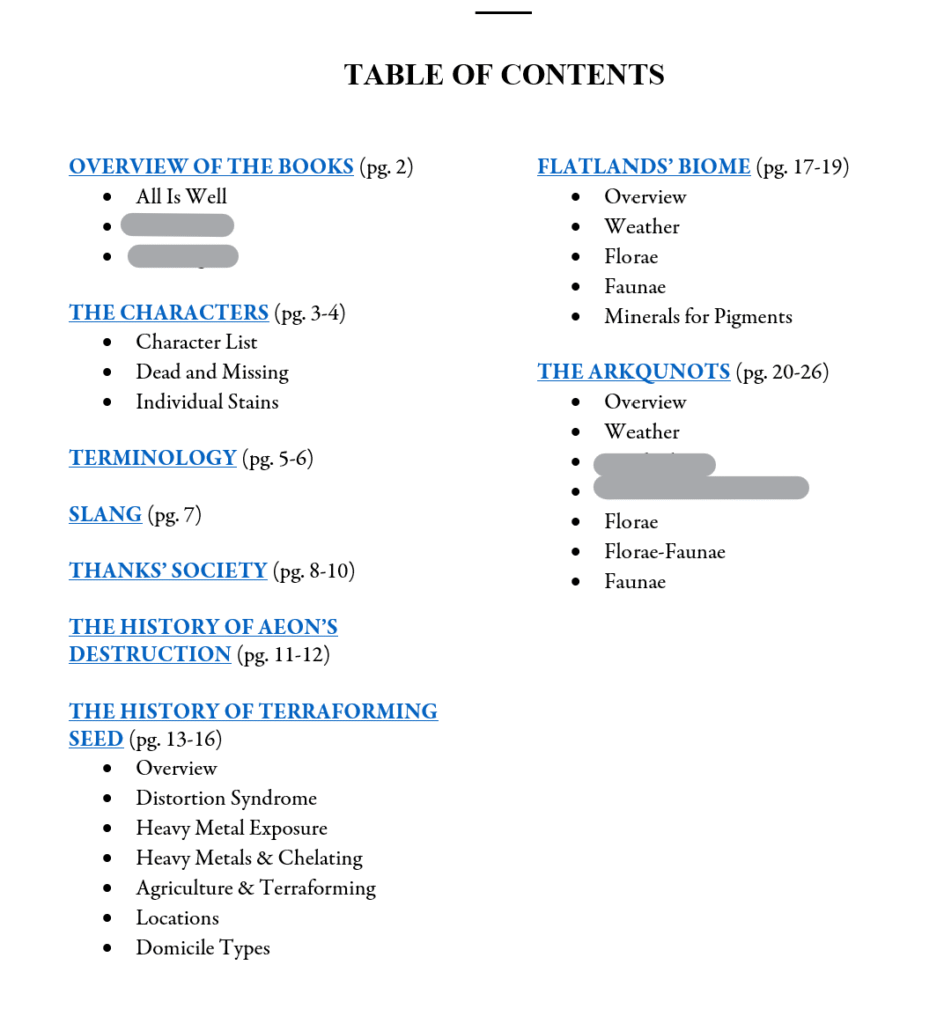I consider myself someone whom Raymond Holt would give a curt but approving head nod to if I showed him my OneNote organization system. So, when my agent asked me to assemble a story bible for The Arkqunots Project, I thought: Pffffft. Give me 20 minutes.
Narrator: It was not 20 minutes.
At the time, I had just been released from the hospital after undergoing lung surgery. I was suffering from the worst brain fog of my life, and trying to type a single coherent text message was harder than taking a full breath.
Once I started assembling my notes, I realized (to my horror while Capt. Holt tsk’d at me with a disapproving head shake) just how many world details I keep in my head and not on file. If you’re not familiar with what a story (or series) bible is, it’s basically your lore wiki. It includes all details about your characters, world, and relevant backstories/histories. If your character has a faded scar on her left knee, it gets noted in the bible. This way, all details (no matter how small) remain consistent across your series.
This leads me to the first step of creating a story/series bible:
Start early & create it as you go. Regardless of whether you’re a plotter or a pantser, you likely have some sense of the world you intend to create, such as its magic systems or its time and place. Creating a story bible from the outset not only saves you trouble later, it gives you a central place to refer back to as you go along. Ultimately, it cuts down your work and saves you from rifling through hundreds of written pages and notes to find what eye color that one guy’s dog had.
Choose how to organize it. As far as I’m aware, there’s no “standard” way of organizing a story bible. As long as it’s clear and comprehensive, your system and the modality you choose will work just fine. Personally, I use OneNote, because not only can you sync your notes across the mobile and desktop apps, it gives you notebooks, which contain tabs, which contain pages, which you can color-code and nest. However, other options include Word (you can create hyperlinks within your own document!), Google Docs, Scrivener, or pen and vellum made from the skin of your enemies.
FWIW, the story bible that goes out with my submission to editors was created in Word. I put together a table of contents and created hyperlinks to each section, as you can see:

Know what you need to track. I’m not going to lie to you. It’s everything. Particularly if you’re writing fantasy or science fiction and you’re creating entire imaginary worlds. Just because some element of your world is obvious to you doesn’t mean you shouldn’t add it to the bible. Why? Because concretely describing your world will:
- Clarify the foundation upon which you’re writing your world, forcing you to flesh its rules
- Allows you to remember the nuance of what you created when it’s years later and you’re on book 4
- Enables a future editor to be on the same page as you
So, beyond the obvious, what are some categories to consider adding to your world bible?
Characters (major):
- Full names
- Family tree
- Friends, allies, nemeses
- Physical characteristics
- Place of birth
- Backstory
- Personality traits
- Secrets
- Motivations
- Dwellings
- Education
- Occupation
- Relationships
- Pets and companions
- Magical abilities or special skills
- Access to modes of transportation
Characters (minor):
- Name
- Relation to main characters
- Physical traits
- Relevant information
- Where in the story they are first encountered
- Ultimate fate
Worldbuilding (general):
- Time period
- Magic systems
- Technology
- Planet systems
- Governance
- Language
- Modes of transportation
- Mythology / history / timeline
- Religions and the supernatural
- Major factions/societies
Locations:
- Where (planet/continent/country/region, etc.)
- Population size
- Notable features (landmarks/waterfronts/trade routes)
- Government structure
- Type of government
- Known officials
- Relevant rules & decrees
- Culture
- Customs
- Titles
- Values
- Religion
- Art
- Architecture
- Social structure
- Nature
- Mythological creatures
- Alien forms of life
- Florae
- Weather
- Seasons
- Environmental factors
- Planetary factors
Keep sane. While a bible ought to be comprehensive, you don’t have to write an entire encyclopedia about your world. Many of these categories may only require a short line or two. Ultimately, the point is to keep your story consistent. So, focus on the information that shows up predominately in your books and ensure that’s what ends up in the bible, rather than creating a 2,000 word entry about a nearly extinct spider that gets mentioned only once, if at all.
And remember: whatever system works best for you is the best system to use.
